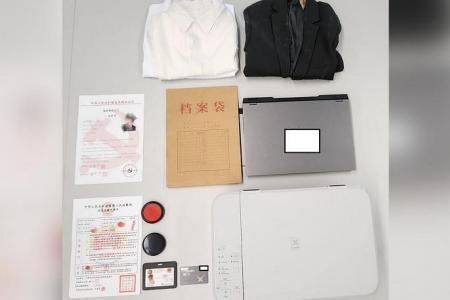Teen allegedly posed as MAS official
A teenager who allegedly posed as a Monetary Authority of Singapore (MAS) official to deceive a woman has been accused of being involved in a government officials impersonation scam.
Chinese national Li Jiarui, 19, was charged on Tuesday with one count of cheating by personation.
He was in a flat at Block 353 Choa Chu Kang Central at around 9.30am on Sunday when he allegedly posed as one “Lin Jiarui” and showed a woman what appeared to be an MAS pass under that name.
Court documents did not disclose what happened next, but in a statement on Monday evening, police said that officers received a call for assistance later on Sunday to verify the identity of a purported government official.
Through follow-up investigations, officers from the Jurong Police Division and Commercial Affairs Department (CAD) managed to establish Li’s identity and arrested him that same day.
Li is now accused of duping the woman into believing that he was an MAS official.
The CAD also seized items from his home, including a laptop, a printer, a brown envelope, a fake MAS pass and a debit card.
The police statement and court documents did not disclose if the case involved monies changing hands.
Li is now remanded at the Central Police Division and his case has been adjourned to July 25.
If convicted of cheating by personation, an offender can be jailed for up to five years and fined.
On Monday, the police said that at least 134 people lost $375,000 to impersonation scams involving government agencies between June 1 and July 12.
They added that the scam involves victims receiving unsolicited phone calls or in-app video calls, purportedly from government agencies such as the Singapore Police Force or the Ministry of Manpower.
The scammers would then claim that there were issues with the victim’s bank accounts which required additional verification.
Victims would also be asked for their banking or personal information, such as banking credentials and one-time passwords, to resolve these issues.
They might also be asked to show their identity cards, work permit or bank cards over the in-app video call.
The victims would discover that they had been scammed only when they see unauthorised transactions made from their bank accounts.
The police advised the public to check with authorised sources before giving out banking credentials over the phone or WhatsApp.
They stressed that the police will not ask for information such as banking credentials and one-time passwords over the phone.
Get The New Paper on your phone with the free TNP app. Download from the Apple App Store or Google Play Store now


